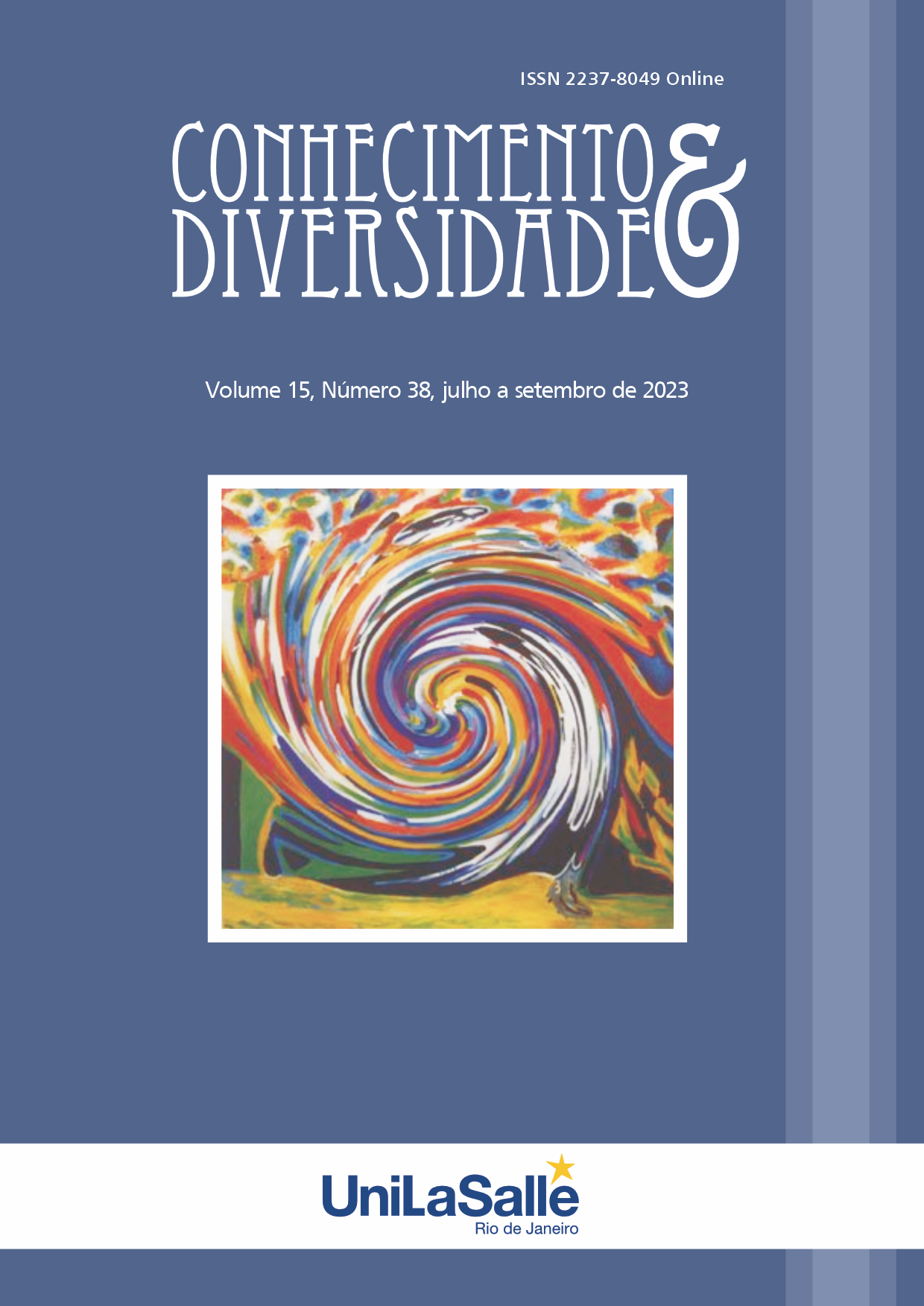O USO DE TECNOLOGIAS DE ORIENTAÇÃO PESSOAL NA FORMAÇÃO PROFISSIONAL DE FUTUROS ESPECIALISTAS
DOI:
https://doi.org/10.18316/rcd.v15i38.11044Palavras-chave:
Tecnologias de aprendizagem orientadas. Educação. Processo educativo. Autogestão.Resumo
No artigo, a análise científica e teórica das tecnologias de aprendizagem orientada para a pessoa mostrou que o elemento essencial de sua aplicação na prática do ensino superior é a transformação do aluno de objeto em sujeito do processo educacional. A condição para tal transformação são certas posições internas de professores e alunos, a saber: interesse genuíno e respeito pela personalidade do aluno como um indivíduo específico; uso de formas e métodos modernos de treinamento profissional de futuros especialistas; percepção emocional-positiva do processo pedagógico; transformação do aluno de um observador passivo que adquire conhecimento e experiência para um interlocutor ativo; incentivo ao estudo com base na cooperação e autogestão, etc.
Referências
ALBOUY V., TAVAN C. Accès à l’enseignement supérieur en France: une démocratisation réelle mais de faible ampleur. Économie et statistique. № 410:61–66, 2007.
ALCINA-CAUDET, A. Encouraging the Use of E-mail and Mailing Lists Among Translation Students. Meta: Translators’ Journal. Vol. 48(4):634-641, 2003.
AUDUC, J. L. Le système éducatif français aujourd’hui. (n. p.): Hachette Education: 464, 2017.
BERNARDINI, S. The theory behind the practice: translator training or translator education? In K. Malmkjsr (Ed.), Translation in undergraduate degree programs. Amsterdam: John Benjamins: 17–29,2004.
BOCQUET, C. La traduction juridique. Fondement et méthode. Collection Traducto.Bruxelles: De Boeck:122, 2008.
BUDIN, GERHARD, KRAJCSO, ZITA & LOMMEL, ARLE. The TransCert project: Ensuring that tansnational translator certification meets stakeholder needs. Translation andInterpreting. 5(1): 143–155, 2013.
BUYSSCHAERT, J.; FERNANDEZ-PARRA, M.; VAN EGDOM, G.-W. Professionalizing the curriculum and increasing employability through authentic experiential learning: the cases OF INSTB.Current trends in translation teaching and learning: 78-111, 2017.
CAMINADE, M. Les formations entraduction et interprétation: Perspectives en Europe de l’Ouest. TTR: traduction, terminologie, rédaction. Vol. 8. N1: 247-270, 1995.
CHYCHUK, A., ZOROCHKINA, T., YACHMENYK, M., KYRYLENKO, N., KUMEDA, О. & MOUGEL, D. Innovative technologies for the implementation of educational activities in higher education institutions. Laplage in Journal. 7(3A): 370-377, 2021. DOI: https://doi.org/10.24115/S2446-6220202173A1416p.370-377
COLINA, S. Teaching translation. From research to the classroom. Boston: McGraw-Hill, 2003. Costof studying in France. Campus France, 2018. URL: https://www.campusfrance.org/en/tuition fees France.
DE WIT, H., HUNTER, F., HOWARD, L., EGRON-POLAK, E. Internationalisation of Higher Education. Study. Brussels, European Parliamentm: 319, 2015. URL:http://www.europarl.europa.eu/RegData/etudes/STUD/2015/540370/IPOL_STU (2015)540370_EN.pdf.
DOBBINS, M., KNILL, C. Higher education governance in France, Germany, and Italy: Change and variation in the impact of transnational soft governance. Policy and Society. Vol. 36. № 1: 67-88, 2017.
BORDAS-BELTRÁN, J. L., ARRAS-VOTA A. M. Mexican students' perspectives on ICT competencies. A gender-based analysis. Revista Latina de Comunicación Social. Vol. 73: 462- 477, 2018.
BROLPITO, A. Digital skills and competence, and digital and online learning. European Training Foundation, 2018: 84, 2018.
CHEN, F., GORBUNOVA, A. R., MASALIMOVA, BÍROVÁ J. Formation of ICT-Competence of Future University School Teachers. EURASIA Journal of Mathematics Science and Technology Education. Vol. 13 (8): 4765-4777, 2017.
HOWE, N., STRAUSS W. Generations: The History of America's Future 1584-2069. New York: William Morrow and Company, 1991: 540, 1991.
KHUANWANGA, W., LAWTHONGA N., SUWANMONKHA S. Development of evaluation standards for professional experiential training of student teachers. Procedia - Social and Behavioral Sciences. № 217: 878-886, 2016.
KNOBEL, M. Digital Literacies: Concepts, Policies and Practices. New York: Peter Lang Publishing: 317, 2008.
KOLODZIEJCZAK, B., ROSZAK M. ICT competencies for academic E-learning. Preparing students for distance education - authors' proposal. ICTE Journal, 6 (3): 14-25, 2017.
LIMBERG, L., OLOF S., SANNA T. Three Theoretical Perspectives on Information Literacy. Human IT: Journal for Information Technology Studies as a Human Science. № 11: 93-130, 2012.
WILLIAMS E. You are the supervisor: The six-focus model, roles and techniques in supervision. Moscow. Independent firm "Klass". 288, 2001.
BERNARD J.M., E. DIGEST. Fundamentals of clinical supervision (2nd ed.) Needham Heights, MA: Allyn&Bakon, 1998.
BERNARD J. M., GOODYEAR R. K. Fundamentals of clinical supervision. Boston: Allyn&Bakon, 1992.
BORDERS L. D., LEDDICK G. Handbook of clinical supervision. Alexandria, VA: Association for Counselor Education and Supervision, 1987.
Downloads
Publicado
Edição
Seção
Licença
Copyright (c) 2023 Daryna Mougel , Svitlana Lypka , Myroslava Fabian , Artur Gudmanian, Inna Humeniuk

Este trabalho está licenciado sob uma licença Creative Commons Attribution 4.0 International License.
Conforme recomendado pelo o Public Knowledge Project, a RCD adota para seus artigos uma licença CREATIVE COMMONS: Atribuição CC BY 4.0.
Esta licença permite que outros distribuam, remixem, adaptem e construam sobre o seu trabalho, mesmo comercialmente, desde que lhe dêem crédito pela criação original.
Esta é a licença mais adequada oferecida.
Recomendado para a máxima divulgação e uso de materiais licenciados.



